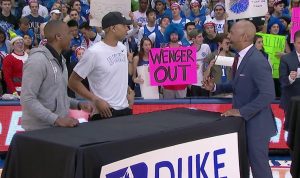I owe Arsene Wenger a personal apology. In the end of his time at the helm of Arsenal FC, Arsene took relentless criticism from not only the fans but all sorts of media outlets for the state of the team. In my defense, the squad was deteriorating and the club had not shown signs of making any reparations. Honestly in regards to Wenger at the time, Batman said it best: “You either die a hero, or you live long enough to see yourself become the villain.” At the time, it felt like Wenger had become the villain and was holding the club back rather than dying a hero and going out on top. Yet it was the people like myself that hurled criticism in his direction that now really bothers me, and I regret taking part in the #WengerOut movement.
Yep, thats me. In my sophomore year at Duke (Spring 2018), College Gameday had scheduled an appearance at Cameron Indoor Stadium for the Duke vs UNC rivalry game that was taking place that day. Knowing that this show is famous for students being able to make signs and broadcast their messages to the world, I thought it was the perfect opportunity to hop on the bandwagon and get my day or so of social media fame. So I made the most visible sign possible, got in line really early to get a front row spot, threw on my Arsenal kit, and was prepared to join in on the social media trend of #WengerOut. I was sick and tired of the club stagnating and starting to backslide that I felt it was the proper thing to do. Not to mention by that point, seeing #WengerOut signs at non-football related events had become somewhat of a meme so I decided I had to capitalize. Well it worked. I was picked up by several popular social media accounts and had my day or so of fame as you can see below…
To some extent, I do stand by those feelings. While I have the utmost respect and admiration for “Le Professeur” as both a man and a manager, I still think he should have left Arsenal in a better position for the future than he did. By that I mean he could’ve gone out on his own terms and in a better light a season or two earlier than he did, while also leaving the next manager a little bit better of a situation to work with in regards to European football and club finances. Like I said, he lived long enough to see himself become the villain. A couple of years removed and that all feels irrelevant to me now, which is probably why I feel regret for turning my back on the best manager in the history of the club and one of the all time greats in the entire history of the sport.
Going back to what I said earlier about people like myself criticizing him that bothered me, I will be the first to admit that with my age and when my Arsenal fandom began, I cannot fully appreciate what Wenger did for the club. He lays claim to 7 FA Cup trophies and 3 Premier League titles with the club. He is also the only manager to ever go a full Premier League season unbeaten (better luck next time, Klopp). Yet, most of that success was before I began to follow the club in 2009-2010 and as such I truly could not appreciate that success as much as older Gooners. That is what bothers me and what I regret the most. All these younger fans who, despite having some degree of credibility in their argument, display a total lack of respect for one of the greatest to ever do it.
That is why I was sad to see him leave the club, and that is why I regret valuing my fleeting stardom on the internet. Arsene Wenger was so much more important to Arsenal FC than a few people posting #WengerOut could ever realize.
That is why I am apologizing to Arsene. Thank you Arsene Wenger for what you have done for the club. I take back anything bad I ever said about you.
#MerciArsene





This is great, Sebastian — both the recounting of your moment of #WengerOut social media fame (and that is an amazing wig, and quite good color choice for the poster I must say!), and your perspective on this now. I think that many others share some of this feeling. The frustrations at the time, and the fact that Wenger probably did stay on a bit too long, did blind many to the bigger picture and the fact of his profound contributions to the club, and therefore to global football. And the times since have shown that Arsenal is, well, just … Arsenal! The ups and downs are part of the story, and maybe weren’t things that could be purely attributed to Wenger. One point the authors of Soccernomics make interestingly, I think, is that Wenger was a pioneer in an effective use of the transfer market to bring in young, promising players. And we do have his mentorship to thank in part for some of the greats of the past decades, including Thierry Henry and Lilian Thuram.